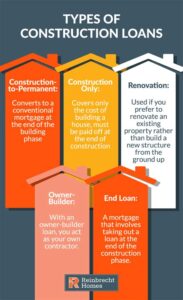
Navigating the world of construction loans can be daunting, especially when interest rates fluctuate. Understanding how these rates impact your loan approval is crucial for both new and seasoned builders. In this article, we will explore the intricate relationship between interest rates and construction loans, highlighting the pivotal role that credit scores play in determining these rates.
With rising interest rates posing potential challenges for approval, we will also discuss strategies to secure more favorable lending terms. Whether you’re planning a residential project or a commercial venture, grasping these concepts will help you make informed financial decisions and pave the way for successful construction financing. Join us as we delve into the complexities surrounding interest rates and empower yourself with the knowledge to navigate your construction loan journey effectively.
Understanding How Interest Rates Affect Construction Loans
When it comes to obtaining a construction loan, understanding how interest rates play a role in the approval process is crucial for borrowers. Interest rates directly influence the monthly payments you will need to make and the total cost of your loan over time. Higher interest rates can significantly increase the overall financial burden of your construction project.
One of the main ways how interest rates affect construction loans is through their impact on affordability. As rates rise, potential borrowers may find that their purchasing power decreases, leading to a reduction in the amount of money they are eligible to borrow. This situation can lead to smaller project budgets and limits on the scope of construction enhancements.
Moreover, lenders view interest rates as an indicator of the economic environment and the likelihood of repayment. In a high-interest-rate climate, lenders may impose stricter requirements for loan approval to mitigate risk. This means that even borrowers with good credit may face challenges securing a construction loan if rates are elevated.
On the other hand, when how interest rates are low, borrowers often benefit from lower monthly payments and reduced total loan costs. This favorable scenario can make it easier to qualify for loans and can lead to a broader range of financing options. In fact, borrowers may even find incentives from lenders to encourage loan applications when rates are at attractive levels.
The interaction between interest rates and construction loans can significantly influence the approval process and overall lending experience. By staying informed about current how interest rate trends, borrowers can make more strategic decisions regarding their construction financing endeavors.
The Role of Credit Scores in Interest Rate Determination
When applying for a construction loan, your credit score plays a significant role in determining the interest rates available to you. Lenders assess credit scores to evaluate your creditworthiness, which in turn affects how interest rates are calculated for your loan.
Generally, the higher your credit score, the lower the interest rates you will be offered. This is because a strong credit score indicates that you have a history of responsible borrowing and timely repayments, reducing the perceived risk for lenders. Conversely, lower credit scores can lead to higher interest rates, as these scores suggest that you may be a higher risk borrower.

To improve your chances of securing a favorable interest rate on your construction loan, it’s essential to understand the credit score ranges:
| Credit Score Range | Rating | Typical Interest Rate Impact |
|---|---|---|
| 300 – 579 | Poor | Higher Interest Rates |
| 580 – 669 | Fair | Higher-Moderate Interest Rates |
| 670 – 739 | Good | Average Interest Rates |
| 740 – 799 | Very Good | Lower Interest Rates |
| 800 – 850 | Excellent | Lowest Interest Rates |
Improving your credit score requires a strategic approach. Ensure timely payments on existing debts, reduce outstanding balances, and avoid accumulating new debt during the loan application process. By taking these steps, you can enhance your credit profile, which will influence how interest rates are determined, potentially leading to better financing options for your construction project.
Higher Interest Rates: Challenges for Construction Loan Approval
When navigating the complexities of construction financing, higher interest rates can pose significant challenges for your loan approval process. How interest rates influence not just the cost of borrowing but also the lender’s willingness to approve your loan is critical to understand. As interest rates rise, lenders often become more stringent in their evaluations, which can impact both prospective and current borrowers.
One of the primary challenges is the increased monthly payments that come with higher interest rates. Borrowers may find that their existing financial situation no longer aligns with the heightened requirements, making it difficult to meet the debt-to-income ratio that lenders typically consider essential for approval.
Additionally, high interest rates can lead to an increased perceived risk from lenders. This can result in tougher credit score thresholds and more stringent documentation requirements. Lenders may want to see a more substantial down payment as a buffer against potential financial instability, further complicating the approval process for first-time borrowers or those with less-than-perfect credit profiles.
Moreover, fluctuating interest rates can affect the overall feasibility of construction projects. If resources are tied up in financing, potential borrowers may be deterred from proceeding with their plans, opting instead to delay or scale back their projects until more favorable conditions arise.
Understanding the effects of rising interest rates on construction loan approval is vital for anyone looking to secure financing. With enhancements to your financial profile and strategic planning, you can mitigate some of these challenges and increase your chances of obtaining the necessary funds for your project.

Ways to Secure Better Interest Rates for Your Loan
Securing a favorable interest rate on your construction loan can significantly impact your overall financing costs. Here are several effective strategies to help you achieve better rates:
- Improve Your Credit Score: A higher credit score often leads to lower interest rates. Consider paying down existing debts and ensuring timely payments on all your financial obligations.
- Shop Around: Different lenders may offer different rates. Take the time to compare offers from multiple institutions to find the most competitive interest rate.
- Provide a Larger Down Payment: Offering a larger down payment can decrease the amount being financed, potentially resulting in a better interest rate due to reduced lender risk.
- Consider Fixed vs. Variable Rates: Evaluate whether a fixed-rate or a variable-rate loan suits your long-term plans better. Sometimes, a variable rate might start lower than a fixed-rate, but it’s essential to weigh the potential for future increases.
- Be Prepared with Documentation: Having all necessary financial documents readily available can streamline the application process and demonstrate to lenders that you are a prepared and responsible borrower.
- Negotiate Loan Terms: Don’t hesitate to negotiate with lenders. Sometimes, simply expressing your desire for better terms can lead to improved offers.
- Look for Special Programs: Investigate if there are any state or local programs offering assistance for construction loans, especially for first-time buyers or specific demographics.
By implementing these strategies, you can enhance your chances of obtaining a construction loan with favorable terms, thereby achieving your goal of creating your ideal construction project while managing costs effectively.
Long-Term Effects of Interest Rates on Construction Financing
The impact of interest rates extends far beyond the initial approval of a construction loan; it shapes the financial landscape of a project throughout its lifecycle. Understanding the long-term effects is essential for any borrower and can influence project planning and investment decisions.
One significant long-term effect of fluctuating interest rates is the overall cost of financing a construction project. With how interest rates are determined based on economic conditions, a rise in rates can significantly increase monthly payments and the total interest paid over the life of the loan. This increase can lead to budget overruns and may force borrowers to reconsider project timelines or scaling.
Moreover, higher interest rates may impact the resale value of properties. If new homeowners are facing higher mortgage rates, they might be less willing to pay a premium for newly constructed homes. This potential reduction in demand can adversely affect the marketability of properties, thus influencing a developer’s long-term return on investment.
Another critical point is refinancing. Borrowers may find it challenging to refinance existing loans when interest rates remain high. This scenario can result in prolonged reliance on higher-cost debt and limited liquidity for new projects.
Long-term economic implications like inflation can interact with interest rates, affecting purchasing power and the overall health of the construction industry. Borrowers must consider these factors when budgeting for future projects, as they might need to adjust for the potential rise in construction costs alongside interest rates.
A comprehensive understanding of the long-term effects of interest rates on construction financing is crucial for effective financial planning, risk management, and maximizing profitability in construction projects.

Frequently Asked Questions
What are interest rates and why do they matter for construction loans?
Interest rates represent the cost of borrowing money. For construction loans, they are crucial because higher interest rates increase overall loan costs, affecting affordability and approval chances.
How do rising interest rates influence loan approval?
Rising interest rates can tighten lending standards, making it harder to qualify for a construction loan. Lenders may require higher credit scores and lower debt-to-income ratios as rates increase.
Can I still get a construction loan if interest rates are high?
Yes, it’s still possible to obtain a construction loan during periods of high interest rates, but it may require a strong financial profile, such as a good credit score and a substantial down payment.
What other factors, besides interest rates, affect construction loan approval?
Other factors include your credit score, income stability, employment history, down payment amount, and the overall project feasibility. Lenders look at your entire financial picture.
How can I prepare for a construction loan application amid fluctuating interest rates?
To prepare, check your credit score, reduce debt, save for a larger down payment, and gather documentation of your finances. Additionally, staying informed about interest rate trends can help you time your application.
What types of construction loans are affected by interest rates?
Both fixed-rate and adjustable-rate construction loans are impacted by interest rates. Fixed-rate loans have a consistent rate, while adjustable-rate loans can change, often increasing payment amounts over time.
Are there strategies to mitigate the impact of high interest rates on construction loans?
Yes, strategies include locking in interest rates early, exploring different lenders for competitive rates, considering shorter loan terms, and evaluating different types of financing that might offer lower rates.

Leave a Reply